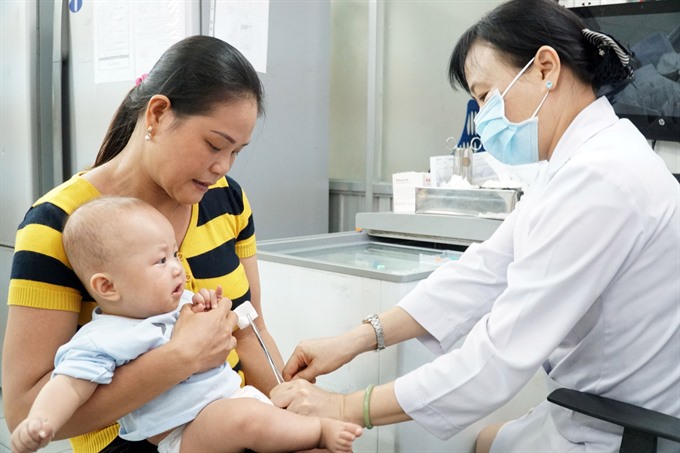 Society
Society

The national digital vaccination database currently covers 11,000 immunisation locations in local health communes and hospitals across the country.
 |
| Children being immunised with the Quinvaxem vaccine (against diphtheria, pertussis, tetanus, hepatitis B, and hemophilus influenza) in HCM City’s Pasteur Institute. — VNA/VNS Photo Phương Vy |
HÀ NỘI — The national digital vaccination database currently covers 11,000 immunisation locations in local health communes and hospitals across the country.
The extending coverage of the digital system has proved to be useful to health workers and authorities alike, said Dương Thị Hồng, Deputy Director of the National Institute of Hygiene and Epidemiology, during a conference yesterday.
“The health ministry is aiming towards eliminating paper-based immunisation registries, minimising reliance on physical record books and documents, and moving our management duties onto computer software,” she said.
Currently, national immunisation information systems have been implemented in most health communes where vaccines shots are provided, leaving only a few locations not yet connected to the database, especially delivery centres and paid immunisation centres.
Hồng said she expects the database will reach these locations soon.
Right now the target population – 10 million children and women – are currently managed by the electronic system.
In the future, the National Expanded Programme on Immunisation will collaborate with relevant agencies to review existing paper records and reports, to update information on the system and make it easier for health workers.
In 2018, the Immunisation Week, a global public health initiative by the World Health Organisation (WHO) to raise awareness and promote the coverage of immunisation around the world, was also held in Việt Nam in April with the theme “Protected Together, #VaccinesWork.”
The campaign aimed to “maintain the achievements of the national expanded immunisation programme, mobilise support, investment and involvement from all levels of authorities and domestic and foreign agencies” in the vaccine efforts, especially in remote mountainous and island areas.
Expanded immunisation has always received great attention from the Government.
Last year, Prime Minister Nguyễn Xuân Phúc issued Decision 1125 to approve the National Target Programme on Health and Population for the 2016-20 period, with the national expanded immunisation continuing to be a focal point.
According to a report by the National Institute of Hygiene and Epidemiology, in the first three months of 2018, vaccination has witnessed considerable progress.
The rate of newborns being vaccinated against hepatitis B in the first 24 hours after birth reached 16.9 per cent, higher than the same period in 2017 16.2 per cent.
The number of cases of whooping cough in the first three months decreased compared to the same period in 2017 and no cases of diphtheria disease have been recorded (there are five cases in the first quarter of 2017).
In February, the Made-in-Việt Nam measles and rubella vaccine (MRVAC) was first introduced in four provinces (Nam Định, Khánh Hoà, Đắk Nông and Bà Rịa – Vũng Tàu). Initial results on 7,787 infants in the 18-24 months age range were positive, with no reports of severe vaccine reactions and low rate of post-vaccination typical reactions such as swelling or pain. — VNS









